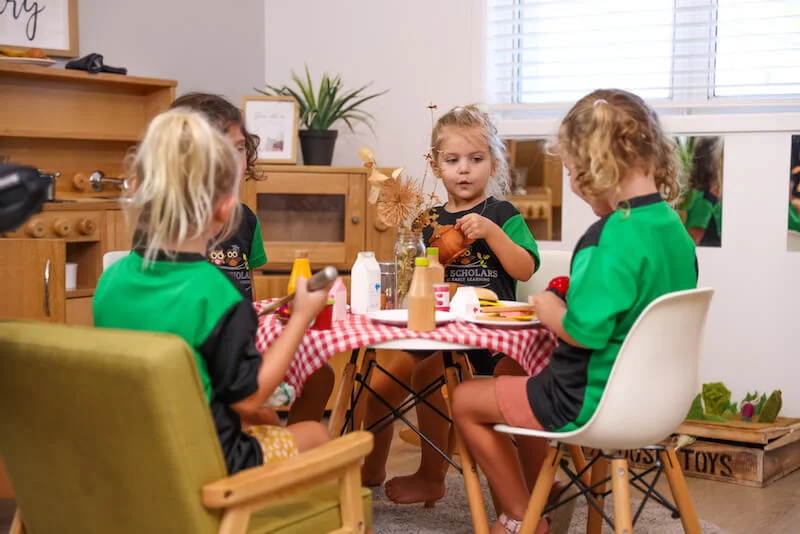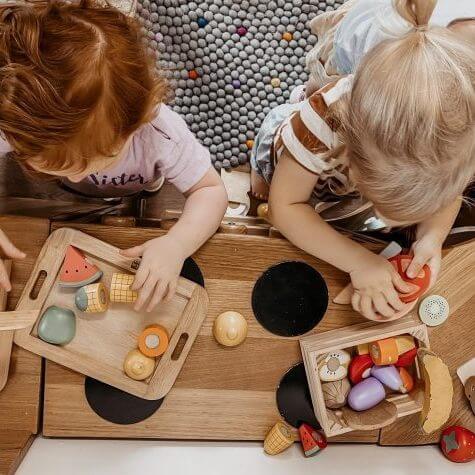At Little Scholars, we use the Early Years Learning Framework (EYLF) to guide our approach to teaching and learning. We combine the EYLF with our commitment to fun and engaging experiences, inspired by the Reggio Emilia educational philosophy, for children that promote their social, emotional, and cognitive development. This, combined with our commitment to reflective practice, is why we believe we provide such a strong foundation for the children in our care.
Little Scholars provides an attractive and safe environment to children in South East Queensland while giving you total peace of mind while your children are in our care. Learning areas include well-equipped playrooms and landscaped outdoor spaces for maximum learning opportunities. Book a tour today to find out more.

What is the EYLF?
Australia’s Early Years Learning Framework (EYLF) was designed to ensure that a consistent standard of early childcare education is provided to all children aged 0–5 years. The framework is a guideline for early childhood educators to use when building out their programs and activities and is something we take to heart at Little Scholars.
Early childhood educators who follow the EYLF provide high-quality, play-based learning experiences to promote children’s physical, emotional, and cognitive development, and help them to become confident, resilient, and engaged learners.
The framework is built on a series of key pillars, principles, practices, and learning outcomes, which we outline below.
The three EYLF key pillars
The three key pillars of the EYLF are Belonging, Being, and Becoming.
- Belonging
Belonging is about children’s relationships and sense of connectedness with their families, communities, and culture. It recognises the importance of supportive relationships in helping children to feel secure, confident, and valued. Children who feel a sense of belonging are more likely to participate in activities, take risks, and explore new ideas and concepts. In this sense, belonging is the foundation for all learning and development, and its easy to derive an intuitive understanding of its importance. - Being
Being recognises the importance of the present moment and encourages children to enjoy the here and now. It is about valuing children’s unique personalities, interests, and strengths, and supporting them to develop a positive sense of self. It recognises the importance of play-based learning and encourages children to engage in meaningful and enjoyable experiences that promote their physical, emotional, and cognitive development. - Becoming
Becoming is about children’s growth and development over time. It recognises that children are active learners who constantly evolve and change. Becoming emphasises the importance of ongoing learning and development and encourages children to develop a strong sense of agency, curiosity, and resilience. Children who are encouraged to explore their interests, ask questions, and take on new challenges are more likely to develop a lifelong love of learning.
The five EYLF principles
There are five principles in the framework that guide educators in providing high-quality, play-based learning experiences for young children.
- Secure, respectful and reciprocal relationships
This principle emphasises the importance of building positive relationships between children, families, and educators. It recognises that children learn best in environments where they feel safe, secure, and valued. This principle also emphasises the importance of reciprocal relationships, where educators and families work together to support children’s learning and development
- Partnerships
Partnerships emphasise the importance of collaboration between families, communities, and educators. This principle recognises that families are a child’s first and most important teachers, and that effective partnerships between families and educators can enhance children’s learning and development
- High expectations and equity
This principle highlights the importance of setting high expectations for all children, regardless of their backgrounds or abilities. It recognises that all children have the potential to learn and achieve, and that equity and inclusion are fundamental to effective early childhood education. Educators who follow this principle provide inclusive and equitable learning environments that promote children’s social, emotional, and cognitive development.
- Respect for diversity
This principle recognises and values the diversity of children and their families, including their cultures, languages, and backgrounds. It emphasises the importance of creating inclusive learning environments that reflect and respect the diversity of the children and families in the community. Educators who follow this principle provide learning experiences that are culturally responsive and respectful, and that promote children’s understanding and appreciation of diversity.
- Ongoing learning and reflective practice
This principle focuses on the importance of ongoing learning and professional development for educators. It recognises that effective early childhood education requires a commitment to ongoing learning and reflection, and encourages educators to continually reflect on their practices and make changes where necessary. Educators who follow this principle are committed to ongoing learning and development, and are able to provide high-quality, evidence-based learning experiences for young children.
EYLF practices
There are several EYLF practices that guide educators in providing high-quality, play-based learning experiences for young children, and they are:
- Holistic approach
The holistic approach recognises that children learn and develop across all domains, including physical, social, emotional, and cognitive. It’s all about addressing children’s holistic needs to promote their overall wellbeing and development. - Responsiveness to children
Responsiveness to children means being attentive and attuned to each child’s individual needs and interests. This practice recognises that children are active learners who construct their own knowledge and understanding of the world, so it’s important to support their interests and curiosity. - Learning through play
Play-based learning is at the core of the EYLF! It recognises that children learn best through play, and we provide open-ended, exploratory learning experiences that promote their creativity, problem-solving, and critical thinking skills. - Intentional teaching
Intentional teaching involves planning and implementing learning experiences that are tailored to each child’s needs and interests. It emphasises the importance of setting learning goals and objectives and using intentional teaching strategies to support their development. - Learning environments
The learning environment plays a crucial role in promoting children’s learning and development. This practice emphasises the importance of creating supportive and engaging learning environments that are designed to promote children’s exploration, inquiry, and learning. - Cultural competence
Cultural competence involves recognising and valuing the diversity of children and families, including their cultures, languages, and backgrounds. This practice emphasises the importance of creating culturally responsive learning environments that promote children’s understanding and appreciation of diversity. - Continuity of learning and transitions
Continuity of learning and transitions involve supporting children as they move through different learning environments and experiences. This practice recognises the importance of providing smooth transitions and building strong partnerships between families, communities, and educators. - Assessment for learning
Assessment for learning involves ongoing observation, assessment, and documentation of children’s learning and development. This practice recognises that assessment is an integral part of the learning process, and emphasises the importance of using assessment to inform and improve teaching practices.
EYLF learning outcomes
The EYLF outlines five learning outcomes that guide educators in promoting the social, emotional, and cognitive development of young children. These outcomes are:
- Children have a strong sense of identity
This learning outcome emphasises the importance of children developing a positive sense of self and their place in the world. It recognises the importance of children’s relationships with their families, communities, and culture, and encourages children to explore and express their own unique identities.
- Children are connected with and contribute to their world
This learning outcome emphasises the importance of children developing a sense of connection to their communities and the wider world. It recognises the importance of children’s relationships with their families, communities, and culture, and encourages children to participate in meaningful ways in the world around them.
- Children have a strong sense of wellbeing
This learning outcome emphasises the importance of children’s physical, emotional, and social wellbeing. It recognises the importance of providing supportive and safe learning environments that promote children’s health and wellbeing, and encourages children to develop positive attitudes towards their own wellbeing and that of others.
- Children are confident and involved learners
This learning outcome emphasises the importance of children’s confidence and enthusiasm for learning. It recognises the importance of providing engaging and challenging learning experiences that promote children’s curiosity, creativity, and problem-solving skills, and encourages children to take an active role in their own learning.
- Children are effective communicators
This learning outcome emphasises the importance of children’s communication skills. It recognises the importance of providing opportunities for children to develop their language, literacy, and numeracy skills, and encourages children to express themselves effectively in a variety of contexts and for different purposes.
Benefits of the Early Years Learning Framework (EYLF)
We believe some of the benefits of the EYLF are as follows:
- Promotes holistic development through physical, social, emotional, and cognitive growth via play-based learning experiences.
- Builds a sense of belonging by fostering secure relationships and connections with families, communities, and culture, providing a foundation for confident learning.
- Encourages resilience and independence by supporting children in developing agency, problem-solving skills, and a positive sense of self.
- Values individuality by recognising and nurturing each child’s unique strengths, interests, and potential.
- Supports diversity and inclusion by creating culturally responsive environments that celebrate and respect diversity.
- Develops lifelong learning skills by encouraging curiosity, creativity, and a love for learning that extends beyond the early years.
- Facilitates effective communication by providing opportunities to build language, literacy, and communication skills in varied and meaningful contexts.
- Ensures smooth transitions by supporting continuity of learning as children navigate changes in environments and experiences.
- Guides high-quality teaching practices by providing a structured framework for educators to design intentional and evidence-based learning activities.
- Emphasises well-being by prioritising children’s physical, emotional, and social health within safe and supportive environments.
The EYLF at Little Scholars
The Early Years Learning Framework (EYLF) provides a solid foundation for high-quality, play-based learning experiences for young children.
At Little Scholars, we follow the EYLF principles, practices, and learning outcomes to create a fun and engaging learning environment that promotes children’s overall development and well-being. We’re committed to ongoing learning and reflection to continually improve our teaching practices and provide the best possible learning experiences for young children. If you’re in need of high quality early childhood education for your little ones in South East Queensland, book a tour today.
